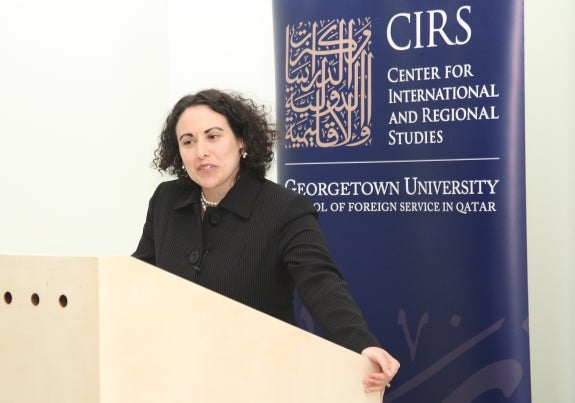Dialogue Series, Regional Studies
Foreign Policy and Regime Survival in Jordan

Debra Shushan, the 2010-2011 CIRS Post Doctoral Fellow, delivered the December Monthly Dialogue on the topic, “Jordan in the Gulf Wars: Foreign Policy and Regime Survival,” where she illustrated key differences between Jordan’s foreign policy initiatives in the first and second Gulf Wars which, respectively, occurred in 1990-91 and from 2003 onward. Shushan noted that “the question that motivates this research is: How do non-democratic states make foreign policy?” Given the dearth of theorizing by political scientists on this question and the opacity of foreign policy-making in autocratic regimes, shedding light on the ways in which a country such as Jordan conducts its foreign policy is crucial in expanding the reach of international relations theories.
As Shushan indicated, Jordan took very different foreign policy positions regarding the two Gulf Wars. During Iraq’s invasion of Kuwait in 1990, the United States was moving beyond the Cold War era and becoming the world’s sole superpower. Led by President George H. W. Bush, the U.S. spearheaded an international coalition against Iraq and put pressure on other countries, particularly in the Arab world, to contribute troops and materiel. Jordan abstained from joining. However, with regard to the U.S. invasion of Iraq in 2003, Jordan adopted a very different policy and became “an important tacit coalition partner of the United States” by supporting the war effort, most crucially through allowing military bases in eastern Jordan to be used in staging operations in Iraq.
Debra shushan monthly dialogue dec 1, 2010 slides from Georgetown University School of Foreign Service in Qatar
In order to explain the drastic change that occurred between the Gulf Wars, Shushan stressed the importance of understanding the regime survival strategies employed by Jordan’s leadership. She maintained that “whether we are in democratic regimes or non-democracies, leaders care first and foremost about retaining power.” To this effect, regime survival depends on identifying and retaining the support of a group of key backers – what Shushan calls “a winning coalition” – which includes financial, social, and military elites, sometimes with the aid of foreign supporters. She argued that “a winning coalition can be more or less populist depending on the extent to which it incorporates support from the mass public.” In both Gulf Wars, Arab governments were faced with the choice of whether or not to back the U.S.-led coalition. Supporting the United States brought the prospects of economic rewards from the U.S. and its Gulf Arab allies, while adopting a neutral or pro-Iraq stance promised domestic support from publics attracted by Saddam Hussein’s populist, anti-imperialist, and pro-Palestinian rhetoric.
Based on interviews she conducted with Jordanian leaders who were close to King Hussein during the first Gulf War, Shushan contends that “because of the extreme strength of public opinion and the dramatic amount of support within the mass public for Saddam Hussein, if the Jordanian regime had in fact sided with the U.S.-led coalition, there was a genuine fear that the regime could be overthrown.” However, in the second Gulf War, economic considerations played a more prominent role in Jordanian foreign policy. In the years leading up to 2003, Jordan’s economic dependence had shifted from Iraq to the United States, with dramatic increases in U.S. aid to Jordan after Amman signed a peace treaty with Israel in 1994 and substantial growth in Jordanian exports to the U.S. following the implementation of the Jordan-U.S. Free Trade Agreement in 2001.
In conclusion, Shushan argued that it was important to understand that not all non-democratic states act in the same way and that further research is necessary to elaborate ways in which varying domestic arrangements shape foreign policy initiatives. Also, she indicated that interesting questions remain regarding how public opinion affects foreign policy in non-democratic contexts. For example, how do autocratic regimes go about gauging the content and intensity of public attitudes? Shushan looks forward to pursuing these questions in her future work.
Debra Shushan comes to CIRS from the College of William and Mary in Williamsburg, Virginia, where she is an Assistant Professor of Government and member of the faculties of International Relations and Middle East Studies. She is working on a book manuscript that examines Egyptian, Jordanian, and Syrian foreign policies in the Gulf Wars through the lens of regime survival.
Article by Suzi Mirgani, CIRS Publications Coordinator